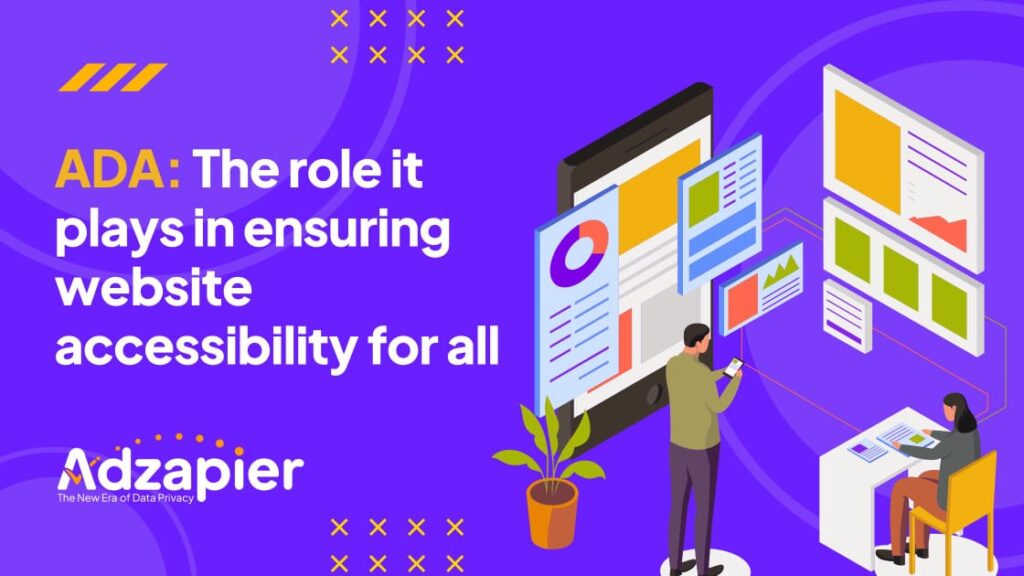The USA has a lot of laws and welfare programs that are designed to help the citizens who have certain special needs, cope with the system that they reside in. In several cases, it has been witnessed that these people are discriminated against, or deprived of the opportunities that may have otherwise been available to everyone else.
The American Disability Act, or the ADA, is designed to help people who suffer from any form of disability, to tackle discrimination in society, while gaining equal employment opportunities as well. Now, while we will be taking a look at this law, in brief, the main focus lies on the data privacy side of things. So, let’s start.
What is the ADA?
The ADA, or the American Disability Act, was incorporated in 1990, and it is a civil rights law that protects the interest of disabled people who happen to fall within the ambit of its jurisdiction. It had previously been witnessed that these people have to face a lot of hardships when it came to job opportunities, carrying out daily public activities, or accessing infrastructure that has been designed for public use. The ADA was passed to combat this, and make the playing ground equal for everyone out there, irrespective of the caste, gender, or colour of the person in question.
The law was later amended in 2009 with the passage of the Americans with Disabilities Act Amendments Act, and what it mostly sought to do was widen the horizon of the definition of the term,” Disability”. The act has been efficiently divided into five sections, with each addressing a specific aspect of a person’s public life.
Title 1 (Equal employment opportunities)
The American Disability Act stipulates that people with special needs shall be given access to equal employment opportunities that are available to everyone else, while the employer must make sure that they aren’t exposed to any activity that may prove to be hazardous to them. The US Equal Employment Opportunity Commission is tasked with enforcing this section, and any company that employs more than 15 people, falls within the ambit of this law.
Title 2 (Non-discrimination on the basis of a disability of a person when it comes to state and local government services)
Several state and local government services are offered to its constituents to raise their standards of living or otherwise. Services like public transport, etc. are designed to benefit society as a whole, and the ADA makes sure that disabilities aren’t discriminated against when it comes to accessing these public services. Everything from the procedures, protocols, etc. to the technical and infrastructural setup of these entities must be compliant with the American Disability Act.
Title 3 (Public accommodations)
When it comes to accessing privately-owned public-use properties, the American Disability Act provides for people with special needs as well. It directs such properties to make changes that would improve accessibility for the disability, while not hampering functionality as well. Everything from malls to health clubs, and more, falls within the ambit of this title. Infrastructural changes are something that the title aims to achieve primarily.
Title 4 (Telecommunications)
Regulated by the Federal Communication Commission, this title aims to offer equal rights and accessibilities when it comes to telephonic or other means of communication to the disabled.
Title 5 (Miscellaneous)
This is a form of provision that includes several miscellaneous subjects that are meant to defend the disabled from a wide range of discrimination like coercion, retaliation, etc.
According to the provision of this act, websites and other online tools need to be ADA-compliant as well, and there are several tools that help do just that. CMP complies with ADA, and other such automated tools offer a wide range of benefits to any business that incorporates these systems with their websites and tools. Here, we will be taking a look at these.
- Using automated tools and systems helps the website comply with the ADA. This boosts the data privacy aspect of a disabled person’s life as well. Legal compliance is essential, as that would help them prevent litigations and lawsuits.
- Being compliant with these legislations helps boost accessibility, and the engagement that visitors thus enjoy would be significantly improved as well. This would be ultimately good for the brand.
- We know that CMP complies with ADA, and incorporating such systems would help earn tax credits as well. As of now, small businesses that adhere to these legislations would be eligible for a tax credit/deduction of up to 5000 USD.
- Being an ADA-compliant website ensures that the data being collected from the visitors is treated in a manner that is in tune with what the data privacy regulations mandate.
- These help businesses and websites to grow immensely as well, as accessibility would ensure greater profitability and conversion rates. These websites can be easily SEO optimized as well.
- Having an ADA-compliant website would be a good image for the brand as well.
- While being ADA-compliant is a good thing for websites, they would need to comply with privacy regulations as well. Having a good CMP software system would help protect the data of the people who visit these websites, and important pieces of information like medical reports, searches, etc. can be kept private.
Final take:
The American Disability Act ensures that every person who suffers from physical difficulties and differences can access similar resources and services that would be able to anyone else who happens to reside in the USA. Several systems and tools, like CMP, help ensure that websites can optimize their websites, thereby ensuring ADA compliance.

